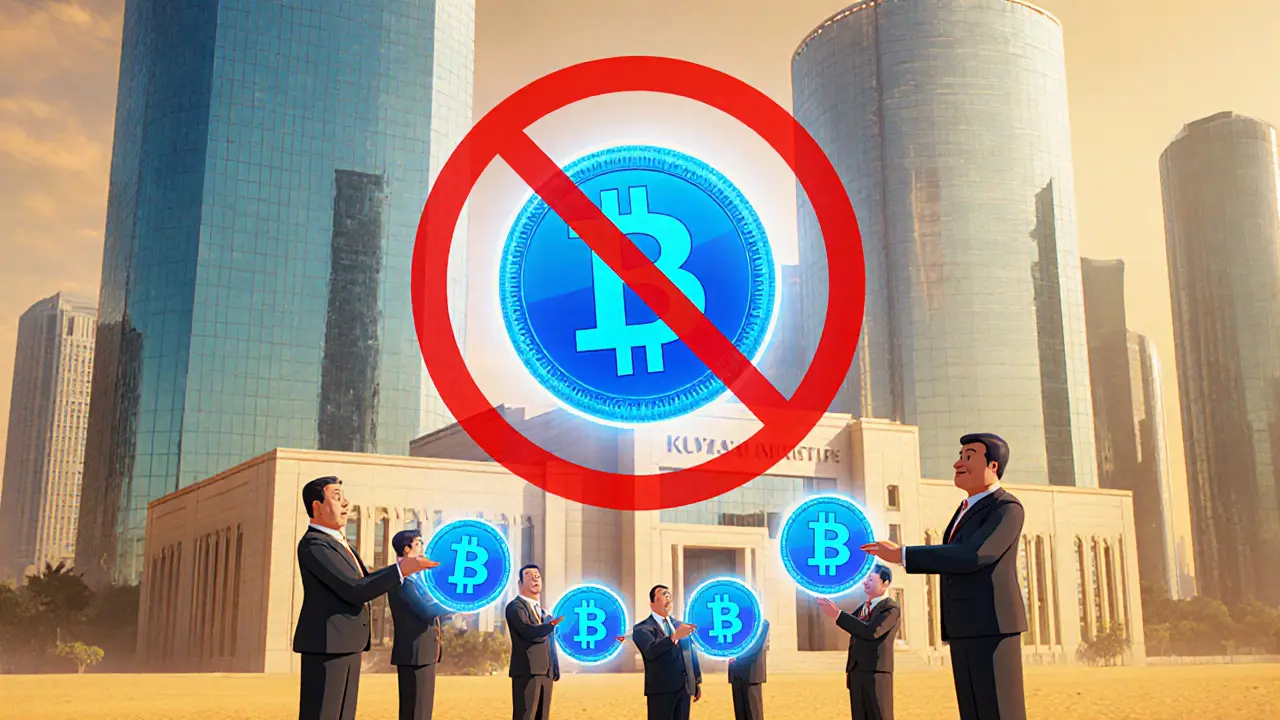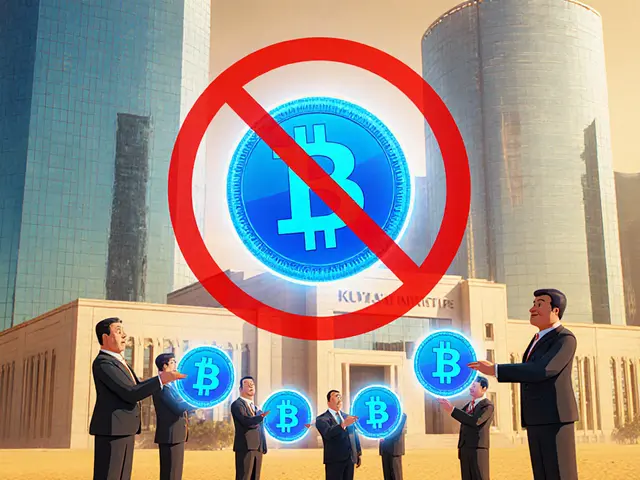Kuwait Crypto Investment Loss Calculator
Investment Impact Calculator
Calculate the potential investment losses due to Kuwait's crypto ban compared to other GCC countries.
Estimated Investment Impact
Key Insight: Kuwait has lost an estimated $1.2 billion in crypto investment since the ban, while the UAE saw $2.1 billion investment in 2024 alone.
Key Takeaways
- The July 2023 circulars impose an absolute prohibition on all crypto‑related activities in Kuwait.
- Banking institutions are barred from facilitating any cryptocurrency transaction or service.
- Crypto‑mining operations are targeted for grid protection, with fines up to 50,000KD and up to five years in prison.
- Kuwait’s stance is the most restrictive in the GCC, costing an estimated $1.2billion in missed investment.
- While enforcement tightens, experts predict a limited non‑crypto blockchain framework may appear after 2027.
Kuwait cryptocurrency ban is an absolute prohibition issued by multiple Kuwaiti regulators that bars payments, investments, and mining of digital assets. The ban was formalised through Ministerial Circular No.(1) of 2023, CMA Circular No.(10) of 2023, and Insurance Regulatory Unit Circular No.(6) of 2023.
What the Ban Covers
Every form of crypto activity falls under the prohibition:
- Payments using any virtual asset.
- Investment or trading of cryptocurrencies on local or offshore exchanges.
- Mining operations, whether hosted in residential, commercial, or industrial premises.
- Issuance of licences for virtual‑asset service providers - none have ever been granted.
The Central Bank of Kuwait (CBK) explicitly forbids banks, finance companies, and exchange houses from processing crypto‑related transactions. The Capital Markets Authority (CMA) mirrors this stance, adding that any breach will be classified as a violation of AML/CFT regulations.
Why Kuwait Took This Hard Line
The primary driver is compliance with FATF Recommendation 15, which demands robust measures against money‑laundering and terrorist financing. Kuwait’s Ministry of Commerce and Industry cited the need to protect the national electricity grid - a concern amplified by the country’s heavy reliance on oil‑fired power generation.
Environmental worries also play a role. Crypto mining is energy‑intensive; in Al‑Wafra, power consumption at suspected mining sites was recorded at up to twenty times the normal residential load, according to Dig.watch’s May2025 update. The Ministry of Electricity and Water (MEW) has installed real‑time monitoring systems to flag abnormal spikes.

Banking Restrictions in Practice
Since the ban’s rollout, the CBK reported 147 crypto‑related violations by banks in 2024, resulting in fines totalling $8.2million. All 45 licensed banks underwent mandatory training on FATF standards in Q32023, and compliance officers now maintain a watch‑list of known crypto wallets.
Typical enforcement actions include:
- Freezing of accounts that receive crypto‑exchange withdrawals - over three accounts were frozen in early 2025 alone.
- Imposition of fines ranging from 10,000KD to 50,000KD for repeated breaches.
- Potential criminal prosecution with penalties up to five years’ imprisonment under the 2025 Financial Technology Amendment Law.
For businesses, the certainty of a zero‑tolerance policy eliminates the need for complex licensing but also bars any legitimate crypto‑related revenue stream.
Crypto‑Mining Crackdown
Mining has become the enforcement focus of the Ministry of Interior (MOI). In 2024 the MOI conducted 89 raids, seizing hardware worth an estimated $12million. By Q12025, mining‑related seizures rose 40% compared with Q42024.
Key technical measures include:
- Installation of smart‑meter analytics by MEW to detect sustained high‑usage patterns.
- Mandatory reporting by telecom providers of traffic to 137 blocked international crypto exchanges.
- Collaboration with electricity distributors to cut off power to verified illegal rigs.
The government reports a 63% drop in crypto‑related fraud cases in 2024 versus 2023, attributing the improvement to the combined banking and mining prohibitions.
Regional Comparison: How Kuwait Stands Among GCC Neighbours
| Country | Regulatory stance | Licences issued (2023‑25) | Estimated crypto‑related investment (USD) |
|---|---|---|---|
| Kuwait | Absolute prohibition | 0 | ~0 (lost $1.2bn) |
| UAE | Enabling framework (VARA) | >250 virtual‑asset firms | $2.1bn (2024) |
| Bahrain | Licensing sandbox | 12 VASP licences | $300m |
| Saudi Arabia | Regulatory sandbox (SAMA) | 7 approved firms | $450m |
| Qatar | Emerging framework (QFC) | Pending | ~$100m |
The table illustrates why Kuwait captures less than 0.3% of the GCC blockchain market, despite the region’s $1.8bn valuation in 2024.

Economic and Technological Implications
By shutting the door on crypto, Kuwait avoids short‑term financial‑stability risks, a point praised by the International Monetary Fund’s 2025 Financial Stability Report. However, the opportunity cost is significant:
- Potential job creation of 15,000 positions (as seen in the UAE) is foregone.
- Estimated $1.2bn of foreign direct investment remains untapped.
- Local tech talent faces brain‑drain toward neighbouring markets with supportive policies.
On the technology front, the National Digital Transformation Strategy earmarks $500million for blockchain infrastructure that explicitly excludes cryptocurrency applications. This indicates a strategic pivot: the government wants the benefits of distributed ledger technology without the perceived financial risks.
Future Outlook
Industry analysts agree that a full liberalisation of crypto is unlikely before 2030. Nevertheless, several scenarios are plausible:
- Limited blockchain licensing - the Ministry of Commerce may issue permits for supply‑chain or identity‑verification solutions that use private‑ledger tech.
- Gradual softening for “stable‑coin” projects that are fully collateralised and supervised by the CBK.
- Continued strict enforcement, especially if regional illicit finance patterns intensify, keeping fines and prison terms at current levels.
For financial institutions, the near‑term priority is robust AML screening and staff training. For entrepreneurs, the realistic path lies in non‑crypto blockchain services that align with the national digital agenda.
Frequently Asked Questions
Is it illegal to own cryptocurrencies in Kuwait?
Ownership itself is not explicitly criminalised, but any transaction, transfer, or attempt to use a cryptocurrency for payment breaches the absolute prohibition and can trigger fines or imprisonment.
Can a Kuwaiti bank facilitate a crypto purchase abroad?
No. The CBK forbids all local banks from processing inbound or outbound crypto‑related transfers, even if the counterparties are overseas.
What penalties apply for illegal crypto mining?
Fines range from 10,000KD to 50,000KD per violation, and offenders can face up to five years in prison under the 2025 Financial Technology Amendment Law.
How does Kuwait’s ban compare to the UAE’s approach?
The UAE adopted a permissive framework (VARA) that licences over 250 virtual‑asset firms and encourages crypto‑related innovation. Kuwait, by contrast, enforces a total prohibition, resulting in zero licences and an estimated $1.2bn loss in investment.
Will Kuwait ever soften its stance?
Analysts predict limited non‑crypto blockchain licensing may appear after 2027, but a full crypto‑friendly regime is unlikely before 2030.


Comments
Wow, the Kuwait crypto crackdown is a textbook illustration of regulatory overreach colliding with fintech innovation. The banks are basically tossing blockchain enthusiasts into a compliance blackhole, and that’s a massive signal to capital that the region is tightening its grip on digital assets. It’s not just a ban; it’s a full‑scale sanction ecosystem that smothers mining rigs, stifles exchange liquidity, and erodes investor confidence. Think of it as a firewall that’s been set to "reject" every outbound crypto transaction. If you’re a startup looking to scale, you’ll have to reroute your pipelines to the UAE or Saudi Arabia, where the policy climate is far more “venture‑friendly.” This shift will inevitably reallocate billions of dollars, recalibrating the GCC’s crypto capital map. In short, Kuwait’s stance is a cautionary tale for any jurisdiction flirting with crypto regulation – be clear, be consistent, or watch the money pack its bags.
The ban is a blunt‑force approach that ignores nuanced market dynamics. By crippling both banking channels and mining operations, Kuwait is effectively erasing a nascent ecosystem that could have contributed to diversification. The policy feels reactionary, not strategic, and it signals to investors that the regime values control over innovation. This will drive capital to more permissive neighbors, reinforcing the regional disparity in crypto adoption.
Whilst the arguments presented above are compelling, one must also consider the moral imperative of upholding financial stability. The decision, albeit severe, arguably therrfore safeguards the national banking infrastructure from volatile crypto‑exposures. Nonetheless, it is essential that any regulatory framework be anchored in transparent due process and proportionate measures, lest it undermine public trust in the long term.
It’s easy to get lost in the headlines, but the real takeaway is how quickly policy can reshape an entire sector. For those of us mentoring early‑stage founders, the lesson is to diversify banking relationships early and keep an eye on jurisdictional shifts. If you’re already operating in Kuwait, start scouting for partnerships in the UAE or Bahrain – they’ve already rolled out crypto‑friendly sandboxes. In the meantime, continue educating your team about compliance best practices so that a sudden regulatory pivot doesn’t catch you off‑guard.
Oh great, another government throwing a wrench in the crypto gears. Guess they’re too scared of a little decentralization.
That’s a harsh take, but at the same time, the crackdown could push some developers to focus on privacy‑preserving protocols. It might also spur the community to build more resilient, off‑chain solutions that can survive regulatory turbulence. Keeping a low profile while you work on those tech upgrades is probably the safest bet right now.
Look, the ban hits hard, but it also shines a light on how important community support is. If you’re an investor feeling the sting, consider reallocating to projects that have strong governance and transparent roadmaps. Simpler words: don’t panic, diversify, and keep an eye on the next regulatory update. The crypto world always finds a way to bounce back, especially when we rally together.
From a practical standpoint, the regulatory vacuum in Kuwait is a red flag for any compliance officer. The banking restrictions essentially eliminate the most straightforward on‑ramps, forcing firms to rely on peer‑to‑peer channels that are far less auditable. This isn’t just a inconvenience; it’s a compliance nightmare that could expose companies to AML violations. If you’re thinking of entering the GCC market, start with jurisdictions that have clear crypto licensing frameworks – the UAE’s Virtual Asset License is a good benchmark.
Totally agree with the need for clear rules 😊. It’s frustrating when the policy shifts overnight, but at least we have other friendly hubs in the region. Keep your chin up, and maybe throw in a meme to lighten the mood! 🚀
For anyone still figuring out the practical steps, start by auditing your current crypto exposure and mapping it against the new Kuwaiti regulations. Identify which assets are directly impacted – most likely those held through local banks or mining operations. Then, create a migration plan: move funds to compliant exchanges, explore cross‑border wallets, and update your KYC/AML protocols accordingly. It’s a lot of work, but a systematic approach will reduce risk and keep your operations afloat.
The ban is a patriotic move to protect national financial sovereignty. It sends a clear message that foreign digital assets will not dictate our economic destiny. Anyone who ignores this will find themselves on the wrong side of the law.
They’re just scared of losing control.
When one examines the intricate tapestry of regulatory interventions, it becomes evident that the Kuwaiti stance is not an isolated event but part of a broader philosophical discourse on the relationship between state authority and decentralized technologies. The immediate economic repercussions-losses estimated at over a billion dollars-are, of course, stark and quantifiable, yet they mask a deeper ontological tension. On one hand, the state seeks to preserve monetary stability, invoking the age‑old principle of fiduciary responsibility; on the other, the cryptographic ethos champions autonomy, transparency, and the diffusion of power away from centralized institutions. This dialectic mirrors historic struggles where innovation confronted entrenched power structures, from the printing press to the internet, each epoch forcing societies to renegotiate the terms of control. In the Gulf context, the ban also underscores a geopolitical calculus: by curbing crypto activity, Kuwait may aim to align more closely with neighboring regimes that favor traditional financial channels, thereby preserving regional cohesion. Yet, in doing so, it potentially forfeits a strategic advantage-namely, the ability to attract forward‑looking fintech ventures that could diversify an oil‑dependent economy. Moreover, the mining crackdown adds another layer, targeting the very infrastructure that undergirds decentralization. By dismantling local hash power, the state not only restricts economic participation but also symbolically diminishes the ideological vigor of the movement. One could argue that such measures are shortsighted, as the global trend undeniably leans toward digital asset integration, with central banks exploring CBDCs and regulatory sandboxes proliferating worldwide. Hence, Kuwait’s approach might inadvertently push innovators across its borders, enriching rivals while domestic talent migrates. Ultimately, the story is less about a singular policy decision and more about the perpetual balancing act between preserving order and fostering progress. As history repeatedly shows, the tension between control and liberty fuels perpetual cycles of suppression and resurgence, and the crypto realm is no exception. The critical question for Kuwait-and indeed for all nations grappling with this phenomenon-remains: can a regulatory framework be crafted that both safeguards economic stability and honors the transformative potential of decentralized finance? The answer will likely shape the region’s financial identity for decades to come.